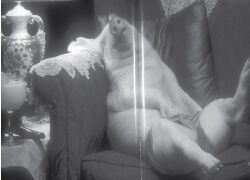
ACE Interviews: Carol J. Adams

What is sexual politics of meat?
The Sexual Politics of Meat (SPoM), as a book, identifies several key aspects of the cultural phenomenon I labelled “the sexual politics of meat.” One is that eating meat has been equated with masculine behavior, and to refuse to eat meat (dead animals) is to make a statement not just about food but about gender. Also, I argue that veganism/vegetarianism has been devalued in our culture by being associated with women. I look at the racial politics of meat eating, what I call the “democraticizing” of meat eating in the US, and how meat eating became equated with a triumphal Western culture. Meat eating became the symbol of colonial power, of virility, and military prowess. So meat eating was imbricated—deeply set—within a patriarchal world that i see as colonialist, racist, and deeply committed to a gender binary.
For those unfamiliar with SPoM, could you explain the term “absent referent” and its importance?
I argue that the absent referent is the animal who disappears to make meat eating and dairy and egg consumption possible. The cow is the absent referent in hamburger, the pig is the absent referent in bacon, pork, ham, the chicken in Buffalo wings, individual fishes in “fish,” or “salmon.” For dairy products and eggs, female animals are particular kinds of absent referents, kept in a sexual slavery while alive to produce what I called “feminized protein.” Through the structure of the absent referent, the animals do not only disappear as living beings, they disappear conceptually and their oppression is leveraged as a metaphor for other oppressions. What’s happening to animals begins to matter only metaphorically rather than literally (for instance, someone else may feel like a piece of meat, but the actual “piece of meat” is of no importance). Women, too, become absent referents in a patriarchal culture, and we find this especially in advertisements for meat. One example I use in SPoM is an image from Playboar of a pig lying in a very sexualized position. Here, the woman is the absent referent. Meanwhile, both steakhouses and a particular animal rights group use images of women fragmented into different parts and pieces of meat as advertisements; in these cases the dead animal is the absent referent. The structure of the absent referent thus creates a constant tension of referentiality; reaching beyond the originating oppression and mirroring, reifying, and not challenging, another oppression.

What’s the importance of showing the underlying connections between oppressed groups?
If we fail to understand the causes of oppression, and how one oppression is drawing upon and being reinforced by another, we will falter as activists. For instance, species prejudices are often mobilized against disempowered human beings; speciesism becomes an excuse for violence against other humans (via racism that animalizes people of color and misogyny that animalizes women). In addition, attitudes about gender and race influence the position of animals. Finally, the species hierarchy that is vigilantly maintained by human exceptionalism is a part of patriarchy. Western culture has been shaped in the image of white, middle class and upper class men (a point I develop in my book Neither Man nor Beast). Can we argue with this culture using the presumptions of that culture? This is why I wrote a “feminist-vegetarian theory” in which I argue that women, animals, and other oppressed groups are linked together through intersecting absent referents.
SPoM was published 25 years ago. How have things changed since then?
First, veganism has wonderfully advanced in twenty five years, though we probably need another fifty years before we will even know the heights vegan cooking can achieve. We have clearly established that you can live very happily as a vegan.
However, veganism is still burdened by superstitions around the gender binary. We have vegan groups who promote the idea that “Real men eat vegetables. Real men are being vegan.” I’d like to see us dismantling the notion of manhood, not just redefining it.
Another development is the increased sexualization of the media. Pornographic motifs like placing women in slaughterhouses, or models clad in the raw flesh of dead animals while posing in a meat locker, that suggest women are like meat would have shocked people in the 1980s, but today are seen as business as usual. While the media should be analyzing these attitudes, it is instead participating in it. (See The Pornography of Meat)
While veganism has helped us increase people’s ability to move away from a meat-centric and dairy-centric diet, I’d like to see more conversation within the vegan community of not perpetuating dominant culture perspectives about gender, race, or sexuality, and that’s a harder struggle.
What about efforts to promote masculinities that are otherwise traditional, but avoid the exploitation of nonhuman animals; the message that one can be a strong muscular man who doesn’t need to eat meat to be strong. Do you feel these message strategies can be counterproductive or do a disservice to the overall movement?
I think it’s fine for us to talk about being strong as vegans, but I would want to stipulate that one of the strengths that we’ve developed as vegans is living in a world that doesn’t care about these issues. Strength is not just a physical or physiological or material quality, but also an emotional and spiritual quality. I don’t want the word strength to be narrowly defined by a term that reifies the idea of “manliness.”
Certainly we can talk about strength and bodybuilding, but why does it have to gravitate to gender definitions? Why can’t we liberate strength by showing how veganism enhances your life in many ways?
How do you suggest we challenge these patriarchal standards in society while working from within that same system?
I don’t think there is any one way to do this. I know we’re up against so much. There’s a variety of ways change happens. We recognize that sometimes laws won’t work, but pressure against corporations will succeed. Undercover films sometimes work by shocking. But the modernist movement at the roots of animal activism has had certain ways of organizing, such as using marches and protests. It’s very logocentric; presuming that arguments will prevail, that if we talk about it enough, or show enough images, that in itself will create change. Now, I’ve known some people who changed that way, just as I’ve known others who changed by reading a book (I hear from some of them!). But out of an entire range of ways to create change, haven’t we limited ourselves to a very circumscribed notion of how change occurs? I love people who pamphlet at circuses or those who organize boycotts of rodeos. But I think some right-brain possibilities for activism exist as well.
In Dream: Reimagining Progressive Politics in an Age of Fantasy, Stephen Duncombe talks about “ethical spectacles,” using bicyclists’ organizing of Critical Mass as an example. During a Ku Klux Klan march, a sousaphone player went alongside them playing really comical music. Another time, protestors showed up at one of their marches dressed as clowns and rode around on their little tricycles calling out “White Flour.” To me, an ethical spectacle is a beautiful vegan meal. If I cause two people to become vegans through a beautiful vegan meal and then teach them how to make beautiful vegan meals, and then they get two people to change, and those two people get two more that influence can expand exponentially. We should honor the idea that cooking and preparing meals is a political act. That is just one example. Because my feminist-veganism arises from a feminist ethic of care, I envision activisms that are care-based, that recognize we live in traumatic times. This recognition requires that we not inflict further trauma through our activism.
One of the biggest problems with a group like PETA is not only their regressive politics of reinscribing on women’s bodies the patriarchal gaze, it’s the lack of imagination to ever think themselves outside of the dominant culture’s mode of seeing.. Thoreau said that the “mass of men lead lives of quiet desperation.” Right now, I think they are living lives of very loud desperation. I don’t want to join that din; I want to find a way in and around it that’s subversive, destabilizing, and liberating. People think there’s nothing on the other side of the oppression they benefit from. Part of what we can do as activists is show what’s on the other side—that it’s beautiful and inviting. In Living Among Meat Eaters, I say, “people think change is hard, not changing is harder, they just don’t know it yet.” I want to encourage multiplicity. Why not explore alternative ways of achieving change instead of silencing them?
In SPoM, you discuss how language plays a role in oppression. Do you have any suggestions or practical applications of how we can liberate our language when communicating with others?
We should be more precise in our language. I’m conflicted about the word “meat” because the animal disappears in it, but you have to start somewhere when critiquing the culture. When we talk about cow’s milk, we should make sure that we’re showing that this milk doesn’t exist separate from the animal it was taken from. Instead of saying “chicken wings” say “a chicken’s wings.” This re-situates the absent referent.
In political language, we should be respectful of other movements’ choice of words, for instance, we should not respond to the hashtag #blacklivesmatter with #alllivesmatter. We should not wrench language that’s already been politicized from its referent and try to seize it for ourselves. We recognize that language exists within a structure of oppression, and we need to consider whether the language we use is helping or hindering someone else’s oppression. Don’t use language that insults someone by associating them with an oppressed group. It should be obvious, but don’t use the body parts of women as insults. Language exists as part of the prop that holds up oppression, and we should not contribute to strengthening its oppressive aspects. That means if we’re challenged that our choice of language is oppressive we should listen to the critique, respect the person voicing the critique, and rethink our choice of words.
Recently, there’s been a lot of discussion among animal rights’ advocates about the “best ways” to promote a vegan diet, and whether or not we should use environmental and health benefits as features of veganism in our messaging. By using these benefits as “selling” points, are we in fact missing the point?
The problem with making health benefits the top issue is that we’re reinforcing a selfish or narcissistic individualistic response. I remember how the women who run Bloodroot, back in the early 90’s observed how a lot of women who had been vegetarian had switched to eating organic meat. The trend changed. So we have to be careful that we aren’t reinforcing the idea that one is moving move from one dietary choice to another. Veganism as a dietary trend completely ignores the animal. I think it’s great that veganism might contribute to my health, but that’s not why I did it. There’s a famous statement by Isaac Bashevis Singer, “I did not become a vegetarian for my health, I did it for the health of the chickens.” But I do believe that as my veganism exists within a feminist framework, it should be articulated using the political connections that feminism makes. And one of those connections is that harming the environment is a feminist issue; thus we have the term “ecofeminism.” From the ecofeminist-vegan perspective, there is a strong connection between what we are doing to individual animals and what we are doing to the environment. Several essays discuss this in the new anthology that Lori Gruen and I edited, Ecofeminism: Feminist Connections with Other Animals and the Earth.
Overall, how do you feel about the current state of the movement and its progress over the years?
We have learned so much in the past forty years! I especially feel positive about the appearance of nonprofits that are doing intersectional work, like A Well Fed World, Brighter Green, Food Empowerment Project, and VINE Sanctuary and how they are situating themselves within multiple oppressions and trying to create important conversations. When I finished writing SPoM, 16 years after I started, I thought that maybe I was commenting on something that was possibly passing away, given that feminism had had some success in the 1980s. A quarter century later and wow, was I wrong. I’m not a very good prognosticator.
As I said in an op-ed I wrote for The Unbound Project, it would be nice not to be a little old lady working for animals, but that’s out of my hands.
Filed Under: Interviews & Conversations Tagged With: intersectionality, messaging, movement building, social movements
About Erika Alonso
Erika is ACE's Project Manager and has been with ACE since 2014. Her work includes researching effective messaging for animal advocacy groups, and how to engage activists through digital media.